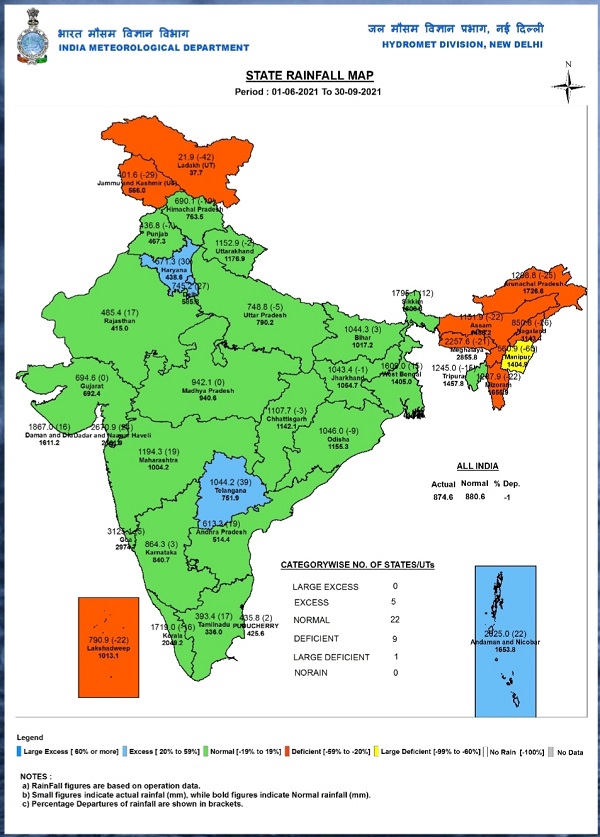New Delhi, (Samajweekly) The southwest monsoon rainfall, during June to September, for the country as a whole, was “normal” with 870 mm rainfall against long period average of 880 mm rainfall, the India Meteorological Department said on Thursday.
“The southwest monsoon seasonal rainfall between June 1 to September 30 for the country was normal, i.e., between 96-104 per cent of long period average (LPA). The rainfall quantum of 870 mm was 99 per cent of the LPA,” it said.
Long period average is calculated based on the data from 1961 till 2010.
The southwest monsoon seasonal rainfall over the four homogeneous regions was normal over northwest India (96 per cent) and central India (104 per cent) while it was below normal over east and northeast India (88 per cent) and above normal over south peninsula India (111 per cent), IMD Director General Mrutyunjay Mohapatra told a virtual media conference.
The rainfall over the monsoon core zone, which consists of most of the rainfed agriculture regions in the country is above normal (i.e., over 106 per cent of LPA).
Out of the total 36 meteorological subdivisions, 20 subdivisions constituting 58 per cent of the total area of the country received normal seasonal rainfall, 10 subdivisions received excess rainfall (25 per cent of the total area) and six subdivisions (17 per cent of the total area) received deficient season rainfall. The subdivisions, which got deficient rainfall, are Nagaland, Manipur, Mizoram and Tripura, Assam and Meghalaya, Arunachal Pradesh, Jammu and Kashmir and Ladakh, west Uttar Pradesh, and Lakshadweep.
Two Met subdivisions which got much higher than normal rainfall in the season are Marathawada and Telangana.
“Considering month to month rainfall variation over India as a whole, the season is very uniquely placed in the historical record for its distinct and contrasting month to month variation. The rainfall over country as a whole was 110 per cent, 93 per cent, 76 per cent and 135 per cent of LPA during June, July, August and September, respectively,” Mohapatra said.
The formation and movement of the cyclone Tauktae over Arabian Sea (during May 14-19) and severe Cyclonic storm Yaas over Bay of Bengal (during May 23 to 28) helped to increase cross equatorial flow and the onset of monsoon. Subsequent features favoured timely advance and the monsoon covered entire country over many regions. However, the onset of monsoon over the entire country was completed by July 13 against normal date of July 8.
The extremely heavy rainfall events were more realised over Konkan and central Maharashtra, north coastal Karnataka, parts of west Madhya Pradesh, east Rajasthan, south Gujarat, Odisha, coastal West Bengal and isolated places of Uttar Pradesh, Jammu, Himachal Pradesh, Uttarakhand, Bihar, sub-Himalayan West Bengal, Assam & Meghalaya, an IMD release said.










